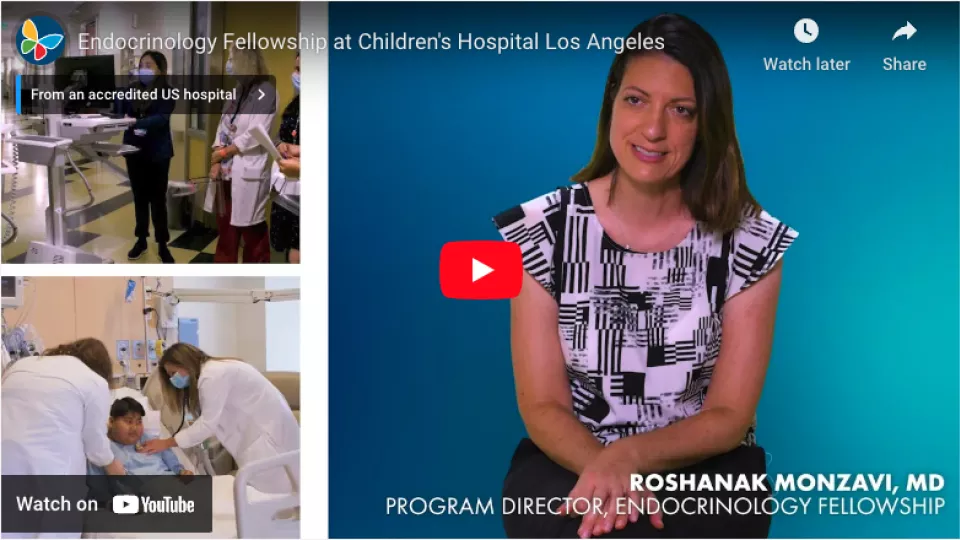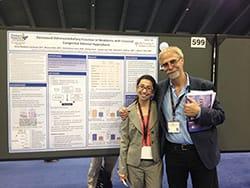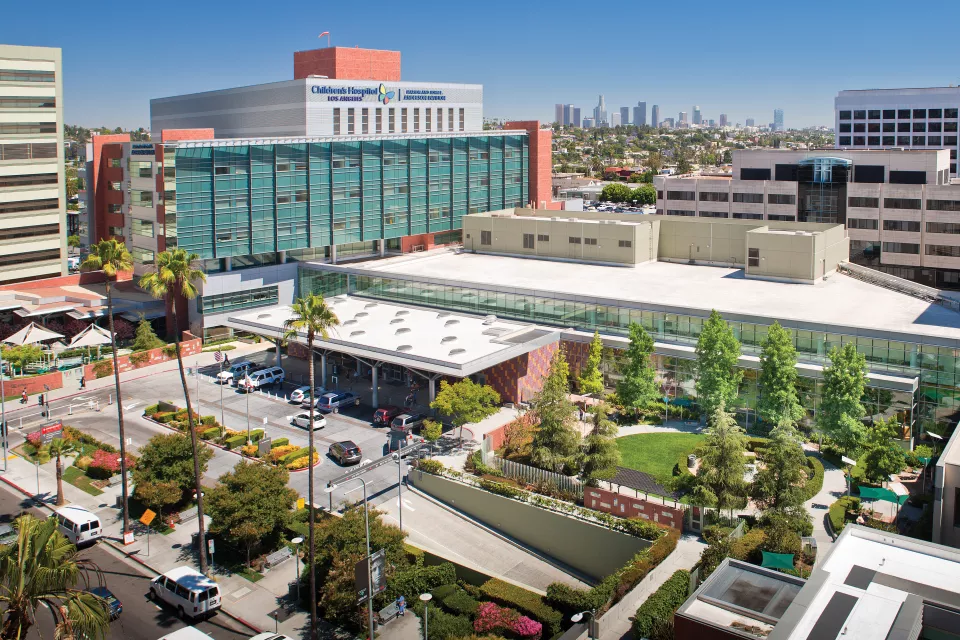
About the Pediatric Endocrinology Fellowship
The Pediatric Endocrinology Fellowship at Children's Hospital Los Angeles is a three-year program intended to prepare trainees for a career in academic pediatric endocrinology. The program combines clinical endocrinology and diabetes care with excellent opportunities for clinical and laboratory-based research within the Division of Endocrinology, Diabetes and Metabolism and through close liaisons within the Department of Pediatrics at Children's Hospital Los Angeles, The Saban Research Institute of CHLA and the Keck School of Medicine of USC. The fellowship program has a rich history of excellence in endocrinology and diabetes extending back almost 30 years.
Learn More About the Program
U.S. News & World Report ranks Children’s Hospital Los Angeles among the best in the country for diabetes and endocrinology care. With 16 full-time and three part-time attending physicians, three PhD research faculty, four full-time nurse practitioners, as well as many nurse educators, the fellows are exposed to a wealth of expertise in various aspects of pediatric endocrinology. In addition, fellows have the opportunity to interact with other highly regarded and productive divisions in the hospital that care for patients with diverse pediatric issues. It is the intent of the program that fellows will be well-trained in diagnosis and management of endocrine disorders of childhood, be able to teach and lecture on endocrinology and diabetes, and be familiar with the methodology and interpretation of routine endocrine and relevant genetic laboratory studies. Another critical component of the fellowship is to be able to design and carry out clinical and laboratory investigations.
Clinical Service
The fellow will spend 12 months during the fellowship as the "on-service fellow." They are on service six months in year one, four months in year two, and two months in year three.
There are three service rotations:
- Endocrine service – fellows do inpatient endocrine consultation and follow inpatient primary endocrine patients
- Diabetes services – fellow does inpatient diabetes consultations and follows inpatient primary diabetes patients
- Outpatient service – fellow sees urgent new diabetes and endocrine patients in clinic.
Each fellow will spend about 50% of their service time on Endocrine service, and the other 50% divided equally between Diabetes and Outpatient services, all under the supervision of an service faculty.
Outpatient Clinic
When off service, fellows will attend two clinics per week including their own continuity clinic. The continuity clinic will carry on through all 3 years of fellowship and will be staffed by a dedicated attending physician. Incorporated in teaching clinic schedule are our multidisciplinary clinics including comprehensive CAH and hyperandrogenism clinic, Turner syndrome clinic, EMPOWER weight management clinic, type 1 diabetes and type 2 diabetes clinics, rare bone disorder clinic, neuro-oncology Clinic, PCOS clinic, and thyroid nodule clinic. In addition, fellows have the opportunity to do rotations in other CHLA divisions, including but not limited to Lipid clinic (Cardiology), Transgender clinic (Adolescent Medicine) and Genetics clinic.
Call
Fellows cover the service on weeknights and weekends all 3 years, in equal rotation with one another, resulting in being "on call" one in every six or seven nights and weekends. Call is primarily from home, though weekend call involves morning inpatient rounds, and fellows are expected to be available to come into the hospital for very rare emergencies.
Research
Fellows engage in research throughout their training (for a total of 22 months while "off service"). In their first year, fellows will choose their research project and mentors, in coordination with the fellowship director. They will lay the groundwork for their project(s), and choose their Scholarship Oversight Committee, which will monitor their scholarly progress throughout their fellowship. During the second and third years, fellows will focus primarily on their research project(s). Clinical research projects are expected to be hypothesis-driven and rigorously performed. Bench research should involve a discrete project in which the fellow does the majority of the hands-on work. Both types of research should lead to one or more first-authored publications for the fellow. Fellows are encouraged to attend and present their research at institutional, local, and national scientific meetings, and the division provides clinical coverage and financial support for these activities. Fellows are required to apply for at least one grant during their fellowship.
Our Research Projects

Endocrinology fellows have the opportunity to participate in a wide variety of clinical and laboratory-based research projects. Fellows develop their own projects, building on one of a number of ongoing projects within the division, or with one of collaborators in other divisions at Children’s Hospital Los Angeles or in the Keck School of Medicine of the University of Southern California.
Below is a list of recent fellow research projects in the past 5 years:
- Gamma Glutamyl Transferase Levels Correlate with Hepatic Fibrosis Staging in Pediatric Patients with Type 2 Diabetes Mellitus (diabetes)
- Immune Checkpoint Inhibitors and Endocrinopathy in Pediatric Oncology Patients (endocrinology)
- Using Games to Teach Screening for Endocrine Late-Effects of Cancer Treatment (medical education)
- Cognition and Development in Congenital Adrenal Hyperplasia (endocrinology)
- Decreased Motor Skills and Working Memory in Children with Congenital Adrenal Hyperplasia (endocrinology)
- Gender Diversity and Eating Behaviors in Adolescents and Young Adults with Type 1 Diabetes (diabetes)
- Impact of Anti-Obesity Medications on Glycemic Profiles Captured on CGM (metabolism)
- Metabolic and surgical Outcomes in x-linked Hypophosphatemic Rickets (endocrinology)
- Time limited eating in new-onset Type 1 diabetes: Feasibility, Acceptability, and Effect on Beta-cell Function (diabetes)
- CGM Use in Adolescent Time Limited Eating Pilot Study (metabolism)
Other Educational Experience
Fellows have access to a variety of educational experiences during their fellowship, including, but not limited to:
- Thursday morning divisional educational conference (invited speakers, case presentations, journal club)
- Endocrine brown bag lecture series (monthly)
- Pediatric endocrinology board review (bi-weekly)
- Research meetings with fellowship director (bi-monthly)
- Fellows’ core curriculum (covers general education, research and professionalism for all Children’s Hospital Los Angeles subspecialty fellows)
- Responsible conduct of research
- Endo-Urology, Endo-Radiology, and Endo-Genetics joint conferences
- Thyroid tumor board (quarterly)
- Clinical & Translational Research Study Design Course (8 weeks long)
- Divisional research updates
- Diabetes camp
- Pediatric grand rounds
- The Saban Research Institute chalk talks
- Patient education conference participation, e.g., the annual meeting of the MAGIC Foundation
- Access to graduate courses and masters programs at USC with tuition remission
- "Pre-tending" Week
Meet Our Faculty
Please click here to see our faculty.
Meet Our Fellows
Please click here to see our fellows.
How to Apply
Applications are accepted through Electronic Residency Application Service (ERAS). The application cycle opens in July for the following academic year.
Program Fast Facts
- ACGME Accredited: Yes
- Fellows per year: 2
- Application Deadline: October
- Duration: 3 years
- Postgraduate Training Required: 3 years
- U.S. Citizenship requirement: accept citizenship, green card, and J1 Visa
- Salary Minimums:
Post Graduate Year 4: $84,073.60 minimum
Post Graduate Year 5: $87,401.60 minimum
Post Graduate Year 6: $90,667.20 minimum
Post Graduate Year 7+: Compensation will be at the discretion of each division - Benefits Include: Health and dental insurance, 14 days paid vacation + 6 protected sick days, yearly educational stipend, monthly meal stipend, housing stipend ($8,000/year) and 401(k) matching up to 3%
Where Do Fellows Go When They Graduate?
Fellows who have graduated our program obtained faculty positions at:
- Boston Children’s Hospital
- Brown University
- Children’s Hospital Los Angeles
- Children’s Hospital Oakland
- Children’s Hospital Orange County
- Cottage Hospital, Santa Barbara
- Kaiser, Santa Clara
- Kaiser Permanente, Los Angeles
- New York University
- Seattle Children's Hospital
- Stanford University
- UCSF Fresno
- University of Athens
- University of Rochester
- University of Virginia
- White Memorial Medical Center, Los Angeles
Support
In 2018, The CHLA Pediatric Endocrinology Fellowship was the recipient of the three-year Gustavus and Louise Pfeiffer Research Foundation Award, which will support fellows and their research mentors who are performing research in areas of diabetes and/or obesity.
The fellowship has also been supported in part by generous donations from the Homer and Gloria Harvey Family Foundation, Mr. and Mrs. Kenneth and Sherry Corday, Mr. and Mrs. David and Meredith Kaplan, Ms. Monica Lester, Mr. Paul Lester, The Francine Kaufman Endowment, The Marcled Foundation, the Hurlbut-Johnson Charitable Trust, and a grant from Genentech.
